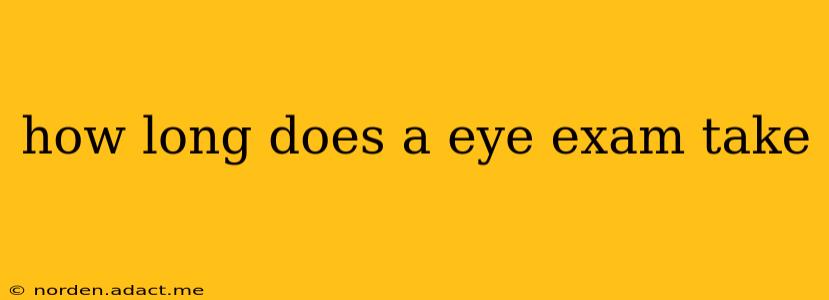A comprehensive eye exam is more than just checking your vision; it's a vital assessment of your overall eye health. The duration, therefore, varies depending on several factors. While a quick vision screening might only take 15-20 minutes, a thorough exam can easily last an hour or even longer. Let's delve into the details.
What Factors Influence the Length of an Eye Exam?
Several factors influence how long your eye exam will take:
- Your individual needs: If you have pre-existing conditions like glaucoma, cataracts, or diabetes, your exam will require more extensive testing. These conditions necessitate a more detailed evaluation of your eye health.
- The type of exam: A basic vision screening focuses primarily on refractive error (nearsightedness, farsightedness, astigmatism) and determining your prescription for glasses or contact lenses. A comprehensive eye exam, however, is far more in-depth, examining the structure and function of your eyes.
- The ophthalmologist or optometrist's approach: Some eye care professionals may be more thorough than others, taking extra time to explain things clearly and answer your questions. This contributes to the overall duration of your visit.
- The availability of technology: Advanced diagnostic tools can speed up certain parts of the exam, but the incorporation of these technologies might also mean a more detailed examination.
What Happens During a Comprehensive Eye Exam?
A comprehensive eye exam typically includes the following steps, each of which contributes to the overall time commitment:
- Visual Acuity Test: This measures how well you see at various distances. It's often the first step and is relatively quick.
- Refraction: This test determines your prescription for glasses or contact lenses to correct your refractive error. It involves using various lenses to assess your vision.
- Eye Muscle Assessment: This evaluates how well your eye muscles work together to focus and move your eyes.
- Intraocular Pressure Measurement (Tonometry): This measures the pressure inside your eye, helping detect glaucoma. This test is often quick but crucial.
- Pupil Dilation: In many comprehensive exams, your pupils will be dilated to allow for a more thorough examination of the inside of your eye. This process takes time and can cause temporary light sensitivity.
- Examination of the Optic Nerve: This assesses the health of your optic nerve, which transmits visual information to the brain.
- Retinal Examination: This detailed examination of the retina, the light-sensitive tissue at the back of your eye, can detect various conditions, including diabetic retinopathy.
- External Eye Examination: This involves examining the eyelids, lashes, and the surface of your eyes for any abnormalities.
How Long Does a Routine Eye Exam Take?
A routine eye exam, focusing primarily on refractive error and vision correction, might take 30-45 minutes. However, adding dilation and a more comprehensive examination of the eye's internal structures can easily extend the appointment to one hour or more.
What About a "Quick" Eye Exam?
Sometimes, you might need a quicker eye exam, such as a pre-employment screening or a driver's license renewal. These exams typically focus solely on visual acuity and may only take 15-20 minutes. However, these are not substitutes for a comprehensive eye exam.
Do I Need a Comprehensive Eye Exam?
The frequency of comprehensive eye exams depends on your age, overall health, and any pre-existing eye conditions. While it's recommended for adults to have a comprehensive eye exam at least every two years, your eye doctor may suggest more frequent exams if necessary. Don't hesitate to ask your eye doctor about how often you should have your eyes checked.
In conclusion, the length of your eye exam is highly individualized. While a quick screening can be relatively short, a comprehensive eye exam that ensures the health of your eyes can take significantly longer. Always discuss your needs and concerns with your eye care professional to determine the appropriate type and frequency of eye exams.
